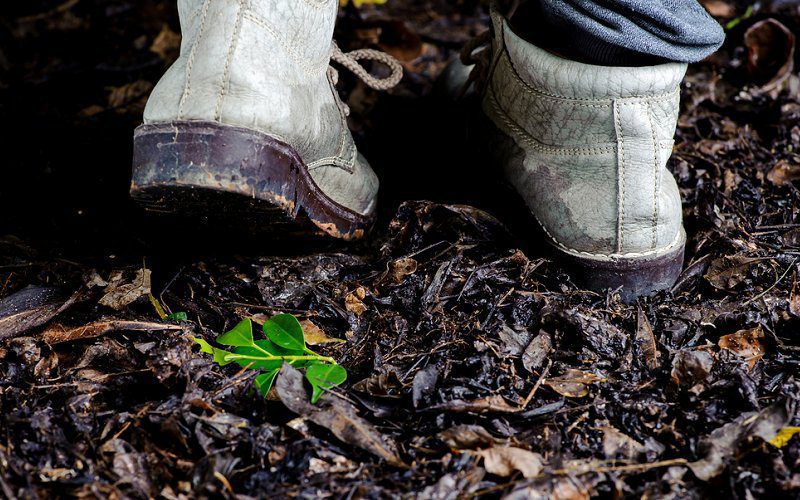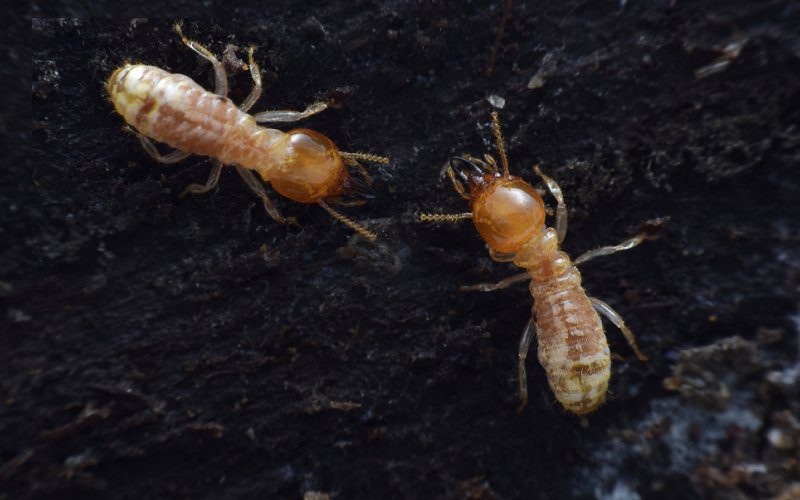
Australian operated

Australian operated
Free on-site visit & quote
Over 14,000+ homes protected
5/5 stars is most frequent rating

“I’m retired and enjoy spending my time out in the garden. Occasionally I might spot what appears to be white ants. Should I be concerned? What do you recommend?”
 Great question Glynis. We’re quite often called out to jobs by concerned home owners where live Termites have been found in the yard – often in garden beds and mulch. Here’s our advice.
Great question Glynis. We’re quite often called out to jobs by concerned home owners where live Termites have been found in the yard – often in garden beds and mulch. Here’s our advice.Okay so, you’ve found termites in the garden, what should you do? Well there’s a few common DIY termite treatment methods that we’ve seen which should be avoided at all costs.
For whatever reason, many homeowners believe that simply using insect spray is an effective way of killing off termites in garden soil. This really isn’t practical at all, as termites live deep beneath the ground in vast numbers. Spraying a handful of them on the surface is pointless. So avoid the temptation to use insect spray; you’ll just make the problem worse and cause them to relocate elsewhere.
Another thing we see quite often are homeowners, especially when working in the yard, simply trying to remove termites in garden areas by shovelling them up into a wheelbarrow and relocating them further away from the property. This of course doesn’t work for the same reasons mentioned above, because it’s most likely that the termite colony is concealed and active termites are already widespread throughout the yard.
Both spraying termites with insect spray or trying to relocate them locally does nothing more than disturb the termites, which simply leads to them relocating in other areas of the garden, yard or, even worse, inside your home.
What we often see is the use of treated pine sleepers, as raised garden beds where they are filled with soil to plant natural herbs and gardens. These pine sleepers are treated with Arsenic or Deltamethrin so when the beds are watered daily these chemicals leak into the soil and eventually those chemicals make their way into your food. In addition to this, timber in direct contact with the ground – combined with high moisture content – serves as an ideal termite nesting and feeding source for termites in the garden.

Termites are naturally attracted to moisture
Overwatering your gardens, trees or lawn can act as an attractant for termites in garden soil. We always encourage homeowners to evaluate their properties to determine where moisture sources around the house originate from.
Fountains, sprinkler systems, timed irrigation systems, and even hot water and air conditioning units that drip water up against the side of the property can lead to unwanted infestations. Of course, this doesn’t mean you can’t water your gardens, it just means being aware of the risks, and ensuring that you’re not doing anything that could potentially lead to termite damage.
Infestations that originate from the garden, yard, or even termites outside are usually associated with wet soil or damp grounds. When we’re called out, we thoroughly evaluate and inspect the location of the termite infestation, the water source, and the severity of the problem to suggest the best possible course of action.

Termites are also commonly referred to as white ants in the garden, but despite the nickname, they are a completely different pest species.
If you do find live termites in garden beds or soil, don’t panic, and don’t attempt any DIY or home remedies such as pouring diesel or petrol on them, setting the nest on fire, using fly spray, chlorine, or any pool chemicals. While it’s distressing to find termites in your yard, it’s always best to call for professional assistance rather than attempt to kill termites in garden areas yourself.
We often have customers who, while digging in their gardens, discover termites in the garden soil 10 or 15 metres away from their homes. They often assume there’s no cause for concern because of the distance away from the property.
The fact is that termites in yard areas can travel up to 50 metres from the main nest. Even if you’ve found termites in yard or garden beds some distance away, it’s still best to have your property professionally inspected.
Many gardeners wonder, are termites in the garden a problem? The answer is yes – while termites in garden soil play a natural role in breaking down organic matter, according to Forest & Wood Products Australia, they don’t distinguish between dead wood in your garden and the timber in your home. Therefore, how to get rid of termites becomes an important consideration for any homeowner.
If you’ve found termites in your garden beds, yard or backyard but not in house, it’s still important to address the issue promptly. According to the Australian Department of Agriculture, termites in soil can quickly spread to wooden structures if left untreated.
Research from the CSIRO indicates that termites in the garden may not immediately threaten your home, but they represent a significant risk factor. Professional termite treatment is the most effective approach for how to kill termites in yard areas safely.
I am an active gardener, does that mean I may inadvertently be creating a haven for termites?

Someone who does a lot of digging and watering in the garden may unknowingly be creating attractive areas for termites to nest. For example, A front porch pot plant that is watered daily often leads to water seeping into the ground through the drainage holes.
This creates a damp concealed area from which termites can derive their water source, leading to potential problems. It can be worse if you have numerous pot plants all stored collectively on a timber deck or porch.
To avoid creating attractive areas around your home while gardening here are some great preventative tips-
Of course, common sense should prevail. These recommendations don’t mean having to maintain a barren landscape and that you can’t enjoy your garden. It’s more regular watering, or continual dampness in the wrong areas which can attract termites and cause problems.
When you’ve found termites in your yard or garden soil, there are several professional approaches to consider:
Prevention and awareness is the best way to protect your home.
Rule number one is to ensure regular termite inspections are conducted on your home. Early detection of any issues will ensure you’re able to perform corrective measures before any substantial damage is done.
For the best protection, we strongly recommend having a termite barrier in place. Depending on the type of construction and location of your home, our technicians will either recommend a chemical barrier, termite bait system or physical barrier. Termite baits serve as an excellent early warning system and can be placed in strategic positions within the yard, near garden or veggie beds set away from your home. Bait stations serve as a barrier to intercept termites before they reach your home and eliminate colonies around the garden beds.

Termites in your garden or yard are more than just a nuisance – they’re often the first warning sign of a much bigger problem. The longer they’re left untreated, the greater the risk of costly structural damage to your home.
At Pest-Ex, our licensed technicians have carried out more than 14,000 termite inspections across Brisbane, the Gold Coast, Logan and Tweed Heads. We know exactly where termites hide, how they spread, and the best way to stop them for good.
Don’t wait until it’s too late – take action today and safeguard your home with a professional inspection.
Find out the exact cost of a professional termite inspection for your property here
Termites can begin damaging timber within weeks. A large colony may cause serious structural damage to a home in as little as 6–12 months if left untreated.
No. Spraying or disturbing termites can cause them to retreat deeper into the ground or into your walls, making them harder to treat. It’s best to call a licensed pest control technician.
A professional termite inspection generally costs between $220 and $350 depending on the size of your property. Many companies, including Pest-Ex, offer free quotes.
Garden beds, tree stumps, wooden fences, mulch and damp soil near your home are common hotspots. Keeping these areas dry and well maintained helps reduce the risk of termites.







